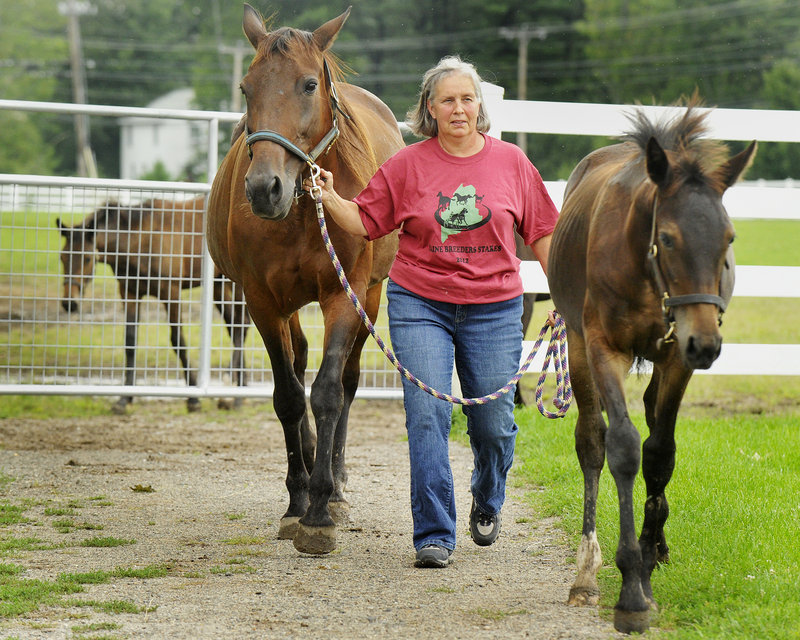Don’t be afraid; be alert.
That’s the advice of public health officials, doctors and veterinarians in Maine regarding the threats of mosquito-borne West Nile virus and eastern equine encephalitis, EEE.
Neither disease has been reported in Maine this year, but cases — which can be fatal for birds, humans and other mammals, especially horses — have been widely documented elsewhere.
West Nile virus has been found in parts of Massachusetts, and mosquitoes with the virus were discovered recently in monitoring pools in New Hampshire. The first case involving a human in Connecticut was diagnosed this week.
“We have not yet seen eastern equine encephalitis or West Nile virus” in Maine this year, said veterinarian Anne Lichtenwalner, director of the University of Maine Animal Health Lab in Orono. “But I expect that we probably will. … I think we should be vigilant.”
Lichtenwalner said officials have been educating people about the illness and how to prevent its spread. In addition, designated pools around the state are being monitored regularly, and the results — with no virus detected — have been encouraging.
Still, with West Nile virus in New Hampshire, it’s close to southern Maine and the numerous horse farms from Arundel to Durham. Plus, this summer’s hot, often humid days, with periods of rain, have created favorable breeding conditions for mosquitoes.
“Be forewarned and be knowledgeable,” said Dr. Stephen Sears, Maine’s state epidemiologist. “People need to be alerted.”
He said he can’t predict when West Nile will spread to Maine. “I can only look to the south and say, ‘It’s there.’“
With autumn approaching, it might seem that the risk will diminish, but Sears said the virus is often detected from mid-August through September, and even into early October.
The drought in the Midwest has been cited as a possible cause of the extensive spread of the virus, on the theory that mosquitoes that cannot find stagnant pools of water for breeding might be “migrating” beyond their usual territories and delivering the virus to new locations.
West Nile virus has caused alarm in several parts of the country, including Texas. On Thursday, the mayor of Dallas declared a state of emergency because of it and ordered the first aerial spraying of insecticide in nearly a half-century.
Nine cases have been reported in Ohio and, according to the federal Centers for Disease Control and Prevention, the virus has spread into 43 states this year.
Almost 700 people have been afflicted nationwide — the most since West Nile virus was first reported in the United States in 1999 — and 26 deaths have been attributed to the virus.
EEE and West Nile virus are seen more often in birds, horses and other mammals than in humans, but people can be infected by mosquitoes carrying the viruses.
West Nile produces no symptoms in about 80 percent of cases involving humans, but may cause flu-like symptoms, usually involving a fever. Mild symptoms can also include headache, vomiting and sometimes swollen glands or a rash.
In more severe cases, patients may have high fever, neck stiffness, stupor, disorientation, coma, tremors, convulsions, muscle weakness, vision loss, numbness and paralysis. Some neurological symptoms can be permanent.
With EEE, the more likely victims are animals — especially horses — and birds. Only a few cases are reported in humans each year, but it kills about a third of those afflicted and causes significant brain damage in most who survive.
Severe cases of the virus — involving encephalitis, an inflammation of the brain — start with flulike symptoms such as sudden headache, high fever, chills and vomiting. In its more dangerous phase, which manifests in neurological symptoms, the illness may progress into disorientation, seizures or coma.
Detecting the virus in mosquitoes and avoiding bites are crucial to controlling the spread of West Nile virus and EEE. The CDC and state officials suggest several ways to reduce exposure to the diseases:
• Try to avoid getting bitten by mosquitoes by staying indoors from dusk to dawn, when they are most active.
• When camping, hiking or picnicking, wear long sleeves and pants, and use insect repellents.
• Drain any pools of standing water, including trash bins and container-plant saucers.
Inexpensive vaccines for both viruses are available for horses, said Lichtenwalner.
Horse owners should check their animals’ vaccination records to be sure their inoculations are up to date, she said.
To reduce exposure, she said, a fly mask can protect a horse’s head and face, and a lightweight blanket can cover its back. Fly wipes containing an insect repellent can be rubbed on animals.
For Lynn-Marie and Bruce Plouffe, who have about 40 standardbred horses on their breeding farm in Saco, there’s little worry. “We’re always concerned,” she said.
But they are confident about the health of their animals because they maintain a regular vaccination program that includes shots and boosters for all of their horses.
“It’s not a guarantee,” Lynn-Marie Plouffe said, but if a vaccinated and otherwise healthy horse gets infected, it doesn’t get as sick or die.
The couple’s 322-acre Dupuis Farm has an inherent advantage: The property has plenty of open land, which allows a good breeze almost all the time. Mosquitoes prefer wetlands or areas that are more secluded, with woods.
Staff Writer North Cairn can be contacted at 791-6325 or at:
ncairn@mainetoday.com
Copy the Story LinkSend questions/comments to the editors.



Success. Please wait for the page to reload. If the page does not reload within 5 seconds, please refresh the page.
Enter your email and password to access comments.
Hi, to comment on stories you must . This profile is in addition to your subscription and website login.
Already have a commenting profile? .
Invalid username/password.
Please check your email to confirm and complete your registration.
Only subscribers are eligible to post comments. Please subscribe or login first for digital access. Here’s why.
Use the form below to reset your password. When you've submitted your account email, we will send an email with a reset code.